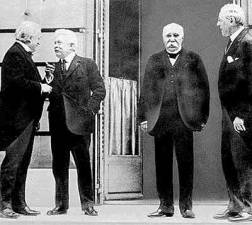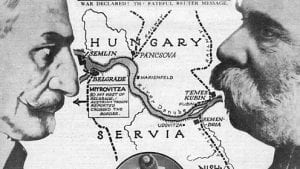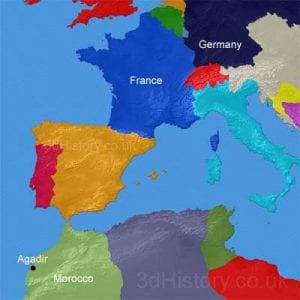Paris Peace Conference (1919)
5.) Distinguishing a variety of perspectives among historical actors participating in a given event.
The Paris Peace Conference of 1919, was a meeting set amongst nations of the world, in order to discuss the terms of peace and punishment for the Central Powers, which included Germany, Austria-Hungary, Bulgaria, and the Ottoman Empire. It was at this conference, that the Treaty of Versailles was formed and signed. The Treaty of Versailles were coined by the Great Powers, France, Britain, and the U.S.
Entering the conference, the consensus was that each nation strive for a peaceful and fair solution, in order to maintain a balance of peace in Europe, and in the world. In this blog, I will be looking at the Great Powers (Britain, France, U.S) and what they truly wanted out of the Paris Peace Conference.
Given that France was the most affected, due to the fact that a lot of the conflict happened on French soil, Clemenceau, French Prime Minister, believed that there could be no place for mercy in this conversation. France wanted to make sure Germany would pay the appropriate damages due. However, it can be argued that France were not particularly worried about the reparations, but rather worried about German resilience. It could be that France wanted to drain Germany so drastically, that Germany would never be able to make an attempt to get revenge against France, and so the terms of The Treaty of Versailles were to insure that Germany would not rise up again. https://www.historylearningsite.co.uk/modern-world-history-1918-to-1980/the-treaty-of-versailles/georges-clemenceau/
Britain headed into the conference with lighter punishment than France. Britain did believe that Germany and the other Central Powers had to be blamed for the war and damage, but they did not want Germany to be drained so badly that they no longer had any power in the international stage. Lloyd George, British Prime Minister, wanted Germany to be able to stand for itself in case of any opposing threat that could appear in future. One of these threats that George could have been referring to was the Bolshevik rise in Russia. At the time, Russia had been under rule of the Bolsheviks, and turned into a communist state. Perhaps Lloyd George saw this rise, and wanted Germany to be able to join the fight against Russia in the event that a war would break out again. https://www.historylearningsite.co.uk/modern-world-history-1918-to-1980/the-treaty-of-versailles/david-lloyd-george/
Lastly, the U.S came into the conference with very idealistic hopes. Wilson, who was President of the US, had hoped for a universal peace that would last for a long period of time. Wilson wanted to see peace in Europe, but also recognised that Germany had committed atrocities that had to be accounted for. However, Wilson did not want to vilify Germany, but rather wanted to assist them into becoming a state of peace. It was easy for Wilson to believe in this, because the war had not affected the US as much as the other states, and although Wilson wanted to see a unified world, he realised there was only so much he could accomplish. https://www.historylearningsite.co.uk/modern-world-history-1918-to-1980/the-treaty-of-versailles/woodrow-wilson/
In an attempt to forgo all secrets and hidden agendas, the Paris Peace Conference proved to be the exact that they wanted to fight against, and although agreements were made, it is clear to see that not everything is as it seems.


